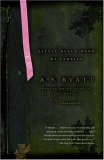Summary | Excerpt | Reviews | Readalikes | Genres & Themes | Author Bio

Critics' Opinion:
Readers' Opinion:
First Published:
Apr 2004, 240 pages
Paperback:
Feb 2005, 256 pages
The sky grew dark grey and in the end the train halted. The children got out, and lined up in a crocodile, and were led to a mud-coloured bus. Penny and Primrose managed to get a seat together, although it was over the wheel, and both of them began to feel sick as the bus bumped along snaking country lanes, under whipping branches, dark leaves on dark wooden arms on a dark sky, with torn strips of thin cloud streaming across a full moon, visible occasionally between them.
They were billeted temporarily in a mansion commandeered from its owner, which was to be arranged to hold a hospital for the long-term disabled, and a secret store of artworks and other valuables. The children were told they were there temporarily, until families were found to take them all into their homes. Penny and Primrose held hands, and said to each other that it would be wizard if they could go to the same family, because at least they would have each other. They didn’t say anything to the rather tired-looking ladies who were ordering them about, because with the cunning of little children, they knew that requests were most often counter-productive, adults liked saying no. They imagined possible families into which they might be thrust. They did not discuss what they imagined, as these pictures, like the black station signs, were too frightening, and words might make some horror solid, in some magical way. Penny, who was a reading child, imagined Victorian dark pillars of severity, like Jane Eyre’s Mr. Brocklehurst, or David Copperfield’s Mr. Murdstone. Primrose imagined—she didn’t know why—a fat woman with a white cap and round red arms who smiled nicely but made the children wear sacking aprons and scrub the steps and the stove. "It’s like we were orphans," she said to Penny. "But we’re not," Penny said. "If we manage to stick together . . ."
The great house had a double flight of imposing stairs to its front door, and carved griffins and unicorns on its balustrade. There was no lighting, because of the black-out. All the windows were shuttered. No welcoming brightness leaked across door or windowsill. The children trudged up the staircase in their crocodile, hung their coats on numbered makeshift hooks, and were given supper (Irish stew and rice pudding with a dollop of blood-red jam) before going to bed in long makeshift dormitories, where once servants had slept. They had camp-beds (military issue) and grey shoddy blankets. Penny and Primrose got beds together but couldn’t get a corner. They queued to brush their teeth in a tiny washroom, and both suffered (again without speaking) suffocating anxiety about what would happen if they wanted to pee in the middle of the night, because the lavatory was one floor down, the lights were all extinguished, and they were a long way from the door. They also suffered from a fear that in the dark the other children would start laughing and rushing and teasing, and turn themselves into a gang. But that did not happen. Every- one was tired and anxious and orphaned. An uneasy silence, a drift of perturbed sleep, came over them all. The only sounds—from all parts of the great dormitory it seemed—were suppressed snuffles and sobs, from faces pressed into thin pillows.
When daylight came, things seemed, as they mostly do, brighter and better. The children were given breakfast in a large vaulted room. They sat at trestle tables, eating porridge made with water and a dab of the red jam, heavy cups of strong tea. Then they were told they could go out and play until lunch-time. Children in those days—wherever they came from—were not closely watched, were allowed to come and go freely, and those evacuated children were not herded into any kind of holding-pen, or transit camp. They were told they should be back for lunch at 12:30, by which time those in charge hoped to have sorted out their provisional future lives. It was not known how they would know when it was 12:30, but it was expected that—despite the fact that few of them had wrist-watches—they would know how to keep an eye on the time. It was what they were used to.
Excerpted from Little Black Book of Stories by A. S. Byatt Copyright© 2004 by A. S. Byatt. Excerpted by permission of Knopf, a division of Random House, Inc. All rights reserved. No part of this excerpt may be reproduced or reprinted without permission in writing from the publisher.





The Funeral Cryer by Wenyan Lu
Debut novelist Wenyan Lu brings us this witty yet profound story about one woman's midlife reawakening in contemporary rural China.
Your guide toexceptional books
BookBrowse seeks out and recommends the best in contemporary fiction and nonfiction—books that not only engage and entertain but also deepen our understanding of ourselves and the world around us.